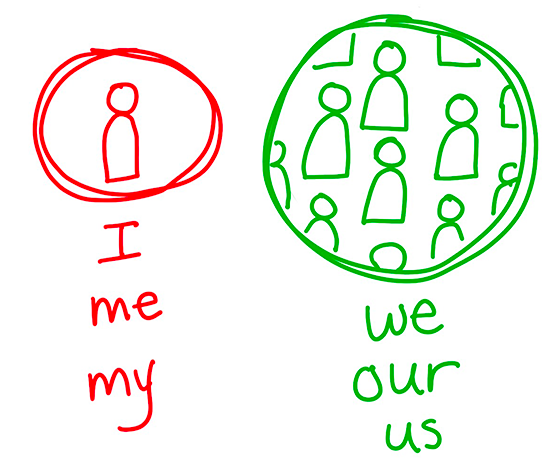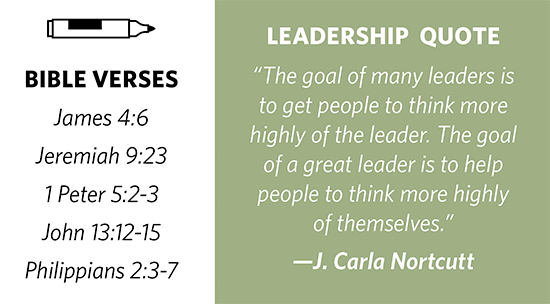
August-
September 2022
Give Me That Mountain!
------------------
|





The column "Leadership Whiteboard" provides a short visual leadership coaching moment. It introduces and explains a new sketch in each issue, provides leadership coaching for further development, and shares a leadership quote and recommended book.
Leaders and First-Person Pronouns
Yawn—yes, pronouns—hang in here as this column discusses leadership, not English 101. For leaders, using first-person possessive pronouns does unintentional damage. Growing up, did you know a mom who made a cuss jar for her kids (or maybe her husband)? You know, the kind where you put in a dollar every time you said a bad word. I have threatened to create a pronoun jar for each time leaders uses first person pronouns to describe a team effort.
It may feel normal to say my church, my team, or my board, but what do people really hear? While sliding off the tongue easily, these little words sound possessive and a little arrogant. Most uses of possessive pronouns never intend ownership, but conversations sound better in our heads than they do to other people.

Our vocabulary reveals the culture we embrace. You can quickly distinguish a Christ-follower’s word choice from the colorful adjectives and adverbs used by a sailor (although, I’m not sure why sailors got this reputation as the quintessential cursers).
I belong to a church where our pastor says, “I get be one of the pastors here” which sounds so much healthier than, “I am the senior pastor.” Even though both use the first-person pronoun, the first embodies team and the second—well, you get the idea. Other staff members follow his example because he models a team culture, one people find approachable.
Team cultures leave little room for possessive pronouns that spotlight only the leader. In contrast, I heard another pastor admonish a church member, “You are upset because your ideas do not align with my vision for the church.” Do you think the church would prefer to pursue his vision or a collective vision adopted together? While leaders need to portray confidence, overused first-person possessive pronouns border on arrogance.
On a recent Bonhoeffer Project Podcast, the hosts’ introduction gave me the following type of compliments, “Ron, you are leading the way in areas of family ministry with conferences and your curriculum is recognized as a leading discipleship tool.”
The “you,” could mean either “you, the organization” or “you, Ron Hunter.” However, our response determines how people in the organization feel their role is viewed. Nothing I do as their leader can be done without them. Therefore, accomplishments belong to “us” and not “me.”
When a team hears its leader say “I” or “me” or “my,” both the team and the organization get lost in the shadows of the leader’s spotlight. It may feel endearing to say, “my board” or “my team.” But “my” also sounds possessive rather than serving. Let's shift and use “our” team!
In the Christian and non-profit world, leaders are stewards, not owners.

|
|

